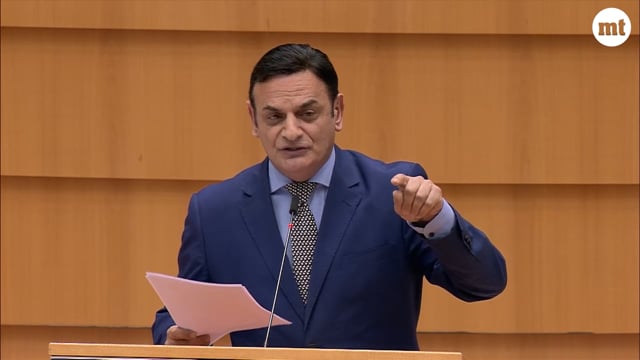Elections first, rule of law later: socialists and EPP postpone vote on Spain, Greece and Malta
EPP and socialists agree to postpone rule of law resolution votes so as not to affect their own parties’ chances in the Spanish and Greek elections

A resolution on the rule of law in Spain, Greece, and Malta was postponed by the European Parliament’s top decision-making body, because top MEPs feared it would interfere in their respective parties’ election chances.
The resolution was withdrawn during the closed-door Conference of Presidents – which gathers the EP political groups’ chiefs – because they feared it would interfere in the upcoming Spanish and Greek elections, key for the socialists (S&D) and the centre-right (EPP).
The resolution was withdrawn from the plenary agenda on 13 April, triggering a blame game between the political groups over the postponenment on a rule of law debate that could have a bearing on key elections in Greece and Spain, in May and December.
‘Tribal mudslinging’ on show in rule of law debate as Malta MEPs spar
The resolution was set to be voted upon in the April plenary, having been already included in the agenda during a debate on the rule of law in Spain, Malta, and Greece between MEPs and Commission Vice President Věra Jourová back on 30 March.
The S&D had initiated the resolution by discussing Greece as part of a broader debate on the Commission’s 2022 rule of law report. In tit-for-tat response, the EPP requested a discussion on socialist-governed Spain, and Malta to be included too.
But after initiating the debates, both major political blocs thought better and decided to block the resolution from this week’s plenary in the CoP, now postponed with no fixed date.
Interestingly, a spokesperson for the S&D told Brussels online newsaper Euractiv that the decision was taken “to prevent the European Parliament from becoming a forum for discussion of national issues, which undermines the credibility of the institution”.
In Spain, regional and municipal elections will occur on 28 May, and national elections are scheduled for December. Recent national election polls show that Partido Popular (EPP) is at the top with 31.5%, followed by governing party PSOE (S&D) at 25.8%.
In Greece, national elections are scheduled on 21 May, and EPP’s governing New Democracy party faces a neck-and-neck race with leftist Syriza after a series of scandals in the past months involving the government’s involvement in wiretapping and negligence in a train-wreck accident.
Greens/EFA MEP Daniel Freund said it was was “sad” to see the largest political groups toying with rule of law as part of their electoral strategy.
March debate
The European Commission’s report on rule of law and its statements on Malta, Spain and Greece were the subject of a debate in the European Parliament, bookended by interventions from Commissioner for justice Vera Jourova.
MEPs discussed the Commission’s latest report over respect of democracy and EU values by member states, with Malta’s two speakers, Nationalist MEP David Casa and Labour MEP Alex Aguis Saliba – who spoke right after each other – making for an interesting contrast on the view of rule of law in Malta.

Casa made clear reference to recent developments in Maltese politics, namely the court decision on the Steward hospitals privatisation and the fraud committed in its award; as well as the police investigation requested into the publication of court evidence in the form of WhatsApp chats between Caruana Galizia mastermind Yorgen Fenech and Labour MP Rosianne Cutajar in 2019.
“The situation is getting worse,” David Casa said. “The state capture of institutions is protecting people in power, for them to get rich on the backs of workers and families.”
Casa denounced the lack of prosecutions for members of the political class over cases of alleged corruption first revealed by the assassinated journalist Daphne Caruana Galizia. “And court prosecutions are failing due to wilful, gross incompetence... unless it concerns the investigation of someone not connected to corruption,” Casa said referring to the criminal action requested by Rosianne Cutajar into Mark Camilleri, who published the Yorgen Fenech chats.
Labour MEP Alex Agius Saliba immediately countered, saying it was the Court of Criminal Appeal that was taking action to protect the evidence collected in the course of the investigation on the Caruana Galizia assassination, from being leaked.
“Malta is under attack by the self-declared paladins of rule of law who think the courts have no right to defend evidence that is important in the prosecution of those accused of assassinating Caruana Galizia. Those who believe in the separation of powers want us to condemn the courts – not the police, David – after the court order to protect the evidence was breached.”
Agius Saliba said Malta had borne the brunt of an average three resolutions every year “over recycled facts and misinformation”, but EPP members were refusing to condemn the Greek government’s spying on the socialist opposition leader.

.png)



















